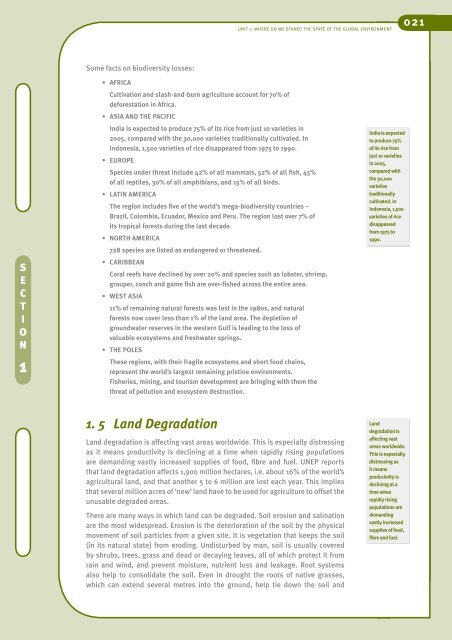Online version: PDF - DTIE
Online version: PDF - DTIE
Online version: PDF - DTIE
You also want an ePaper? Increase the reach of your titles
YUMPU automatically turns print PDFs into web optimized ePapers that Google loves.
UNIT 1: WHERE DO WE STAND? THE STATE OF THE GLOBAL ENVIRONMENT<br />
021<br />
S<br />
E<br />
C<br />
T<br />
I<br />
O<br />
N<br />
1<br />
Some facts on biodiversity losses:<br />
• AFRICA<br />
Cultivation and slash-and-burn agriculture account for 70% of<br />
deforestation in Africa.<br />
• ASIA AND THE PACIFIC<br />
India is expected to produce 75% of its rice from just 10 varieties in<br />
2005, compared with the 30,000 varieties traditionally cultivated. In<br />
Indonesia, 1,500 varieties of rice disappeared from 1975 to 1990.<br />
• EUROPE<br />
Species under threat include 42% of all mammals, 52% of all fish, 45%<br />
of all reptiles, 30% of all amphibians, and 15% of all birds.<br />
• LATIN AMERICA<br />
The region includes five of the world’s mega-biodiversity countries –<br />
Brazil, Colombia, Ecuador, Mexico and Peru. The region lost over 7% of<br />
its tropical forests during the last decade.<br />
• NORTH AMERICA<br />
728 species are listed as endangered or threatened.<br />
• CARIBBEAN<br />
Coral reefs have declined by over 20% and species such as lobster, shrimp,<br />
grouper, conch and game fish are over-fished across the entire area.<br />
• WEST ASIA<br />
11% of remaining natural forests was lost in the 1980s, and natural<br />
forests now cover less than 1% of the land area. The depletion of<br />
groundwater reserves in the western Gulf is leading to the loss of<br />
valuable ecosystems and freshwater springs.<br />
• THE POLES<br />
These regions, with their fragile ecosystems and short food chains,<br />
represent the world’s largest remaining pristine environments.<br />
Fisheries, mining, and tourism development are bringing with them the<br />
threat of pollution and ecosystem destruction.<br />
India is expected<br />
to produce 75%<br />
of its rice from<br />
just 10 varieties<br />
in 2005,<br />
compared with<br />
the 30,000<br />
varieties<br />
traditionally<br />
cultivated. In<br />
Indonesia, 1,500<br />
varieties of rice<br />
disappeared<br />
from 1975 to<br />
1990.<br />
1. 5 Land Degradation<br />
Land degradation is affecting vast areas worldwide. This is especially distressing<br />
as it means productivity is declining at a time when rapidly rising populations<br />
are demanding vastly increased supplies of food, fibre and fuel. UNEP reports<br />
that land degradation affects 1,900 million hectares, i.e. about 16% of the world’s<br />
agricultural land, and that another 5 to 6 million are lost each year. This implies<br />
that several million acres of ‘new’ land have to be used for agriculture to offset the<br />
unusable degraded areas.<br />
There are many ways in which land can be degraded. Soil erosion and salination<br />
are the most widespread. Erosion is the deterioration of the soil by the physical<br />
movement of soil particles from a given site. It is vegetation that keeps the soil<br />
(in its natural state) from eroding. Undisturbed by man, soil is usually covered<br />
by shrubs, trees, grass and dead or decaying leaves, all of which protect it from<br />
rain and wind, and prevent moisture, nutrient loss and leakage. Root systems<br />
also help to consolidate the soil. Even in drought the roots of native grasses,<br />
which can extend several metres into the ground, help tie down the soil and<br />
Land<br />
degradation is<br />
affecting vast<br />
areas worldwide.<br />
This is especially<br />
distressing as<br />
it means<br />
productivity is<br />
declining at a<br />
time when<br />
rapidly rising<br />
populations are<br />
demanding<br />
vastly increased<br />
supplies of food,<br />
fibre and fuel.
















